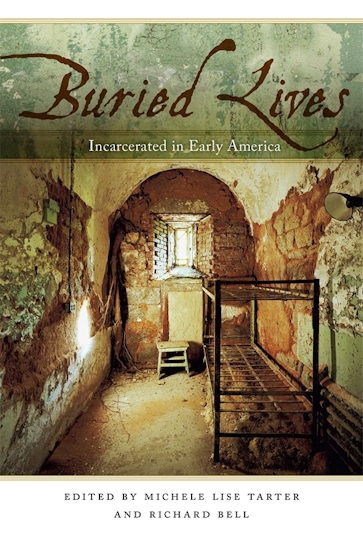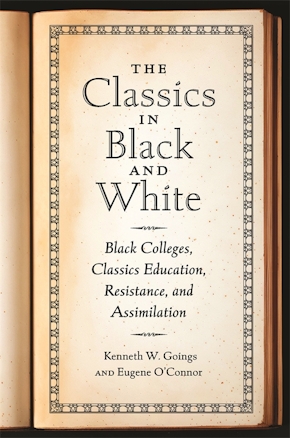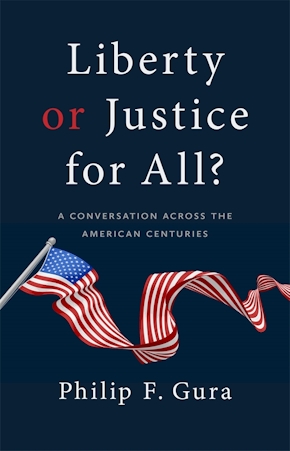Buried Lives
Incarcerated in Early America
Title Details
Pages: 320
Illustrations: 19 b&w photos
Trim size: 6.000in x 9.000in
Formats
Paperback
Pub Date: 03/01/2012
ISBN: 9-780-8203-4120-0
List Price: $36.95
Hardcover
Pub Date: 03/01/2012
ISBN: 9-780-8203-4119-4
List Price: $120.95
Related Subjects
Buried Lives
Incarcerated in Early America
Skip to
- Description
- Reviews
- Contributors
Buried Lives offers the first critical examination of the experience of imprisonment in early America. These interdisciplinary essays investigate several carceral institutions to show how confinement shaped identity, politics, and the social imaginary both in the colonies and in the new nation. The historians and literary scholars included in this volume offer a complement and corrective to conventional understandings of incarceration that privilege the intentions of those in power over the experiences of prisoners.
Considering such varied settings as jails, penitentiaries, almshouses, workhouses, floating prison ships, and plantations, the contributors reconstruct the struggles of people imprisoned in locations from Antigua to Boston. The essays draw upon a rich array of archival sources from the seventeenth century to the eve of the Civil War, including warden logs, petitions, execution sermons, physicians’ clinical notes, private letters, newspaper articles, runaway slave advertisements, and legal documents. Through the voices, bodies, and texts of the incarcerated, Buried Lives reveals the largely ignored experiences of inmates who contested their subjection to regimes of power.
Buried Lives is an antidote to the Rothman/Foucault/Ignatieff trilogy that emphasizes prisons as engines of the state. Intersecting several historical fields, the collection draws from studies on slavery and abolition, reform, poverty and the working class, personal narratives, and print culture. The variety of sources and methodologies employed underlines the book’s potency as a revisionist project. The essays make good use of overlooked or not-so-obvious sources to tease out experiences, incidents, attitudes, and expressions of those incarcerated as well as their keepers.
—Susan Branson, author of Dangerous to Know: Women, Crime, and Notoriety in the Early Republic
A challenging and thought-provoking collection. Prison history tends to focus on the founding elite and to assume that their initial visions were in fact carried out in practice. These lively studies uncover the quotidian realities of guards, clergy, and inmates to counter these assumptions and challenge some dominant theories of the meaning of incarceration. The scholarship is first-rate, based on original archival research into previously obscure sources. Combined, these essays produce a fresh look at the roots of modern penal practices and at the resistance offered by those in these institutions.
—Susan E. Klepp, author of Revolutionary Conceptions: Women, Fertility, and Family Limitation in America, 1760–1820
Buried Lives is a welcomed intervention in penal history. By centrally locating inmates, this phenomenal collection of essays spotlights varied voices and incarceration experiences that speak provocatively about the flawed relationship between criminal 'justice' and American democracy.
—Kali Nicole Gross, Associate Professor of African and African Diaspora Studies, The University of Texas at Austin
Buried Lives is a strong addition to any collection dedicated to crime and punishment throughout history.
—Midwest Book Review
Buried Lives is an important volume for scholars of the history of punishment, as well as those interested in early and antebellum American history, slavery and antislavery, the history of poverty, and the development of American literary and print media forms.
—Jennifer Graber, Journal of American History
The essays in [Buried Lives] have done an admirable job of bringing women, servants, slaves, and the poor to the center of the history of early American. Buried Lives will enrich and enliven undergraduate and graduate survey courses in law and history departments.
—Taja-Nia Henderson, Law and History Review
The book’s contents reflect its geographic origins (about half the volume centers on 18th-century Philadelphia), but as a whole, it lives up to its goal ‘to break incarceration free’ from the ‘historiographical roots’ planted by Michel Foucault, Michael Ignatieff, and David Rothman. . . . Those previously buried lives include ‘vicious men, calculating women, diffident drunks, runaway slaves, immigrant workers, homeless children, victims of domestic abuse and sexual assault . . . the vagrant, the poor, and the enslaved,’ all of which help complicate and enrich the understanding of incarceration in the early U.S.
—M. G. Spencer, Choice
This interdisciplinary approach to the study of punishment in early America provides a much-needed bridge to histories of twentieth-century penal regimes and current prisoners’ rights advocacy movements.
—Jen Manion, Journal of the Early Republic
Jacqueline Cahif
Matthew Clavin
Jennifer Janofsky
Judith Madera
Michael Meranze
Simon Newman
Susan Eva O'Donovan
Leslie Patrick
Jodi Schorb
Jason Sharples
Billy Smith
Caleb Smith
Daniel E. Williams



